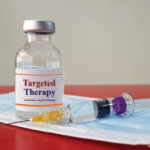“You should be prepared to pull the trigger in these patients that much quicker when prescribing TNFi’s,” says Dr. Maksymowych. “Don’t waste time. … We certainly don’t want to see a patient developing ankylosis.”
Although Dr. Maksymowych points to findings on MRI, a consistent risk factor for disease severity that is affected by treatment and has been used as an outcome in clinical trials, he notes, generally, the field lacks risk factors for different stages of disease progression. “This is an area we think requires a lot more investigation and study,” he says. “We’re all looking for something that is a consistently strong predictor of radiographic progression.”
Dr. Maksymowych especially emphasizes the need to validate surrogates for new bone formation, which can serve as early warning signals of ankylosis. This approach could be a test for gene expression or production of a protein that is consistently associated with radiographic progression and is more responsive to intervention than the mSASSS instrument used to monitor change on radiographs.
Lara C. Pullen, PhD, is a medical writer based in the Chicago area.
References
- Kaaij MH, van Tok MN, Blijdorp IC, et al. Transmembrane TNF drives osteoproliferative joint inflammation reminiscent of human spondyloarthritis. J Exp Med. 2020. 217:e20200288.
- Sepriano A, Ramiro S, Wichuk S, et al. Tumor necrosis factor inhibitors reduce spinal radiographic progression in patients with radiographic axial spondyloarthritis: A longitudinal analysis from the Alberta Prospective Cohort. Arthritis Rheumatol. 2021 Jul;73(7):1211–1219.
- Bleil J, Maier R, Hempfing A, et al. Histomorphologic and histomorphometric characteristics of zygapophyseal joint remodeling in ankylosing spondylitis. Arthritis Rheumatol. 2014 Jul;66(7):1745–1754.
- Bleil J, Maier R, Hempfing A, et al. Granulation tissue eroding the subchondral bone also promotes new bone formation in ankylosing spondylitis. Arthritis Rheumatol. 2016 Oct;68(10):2456–2465.
- MC Hwang Ridley L, Reveille JD. Ankylosing spondylitis risk factors: a systematic literature review. Clin Rheumatol. 2021 Aug;40(8):3079–3093


